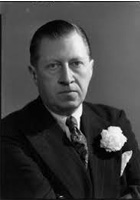Sir Osbert Sitwell
Sir Osbert Sitwell Poems
WHEN Orpheus with his wind-swift fingers
Ripples the strings that gleam like rain,
The wheeling birds fly up and sing,
Hither, thither echoing;
...
Silence o'erwhelms the melody of Night,
Then slowly drips on to the woods that sigh
For their past vivid vernal ecstasy.
...
The long war had ended.
Its miseries had grown faded.
Deaf men became difficult to talk to,
Heroes became bores.
...
Their youth was fevered - passionate, quick to drain
The last few pleasures from the cup of life
Before they turned to suck the dregs of pain
And end their young-old lives in mortal strife.
...
The city's heat is like a leaden pall—
Its lowered lamps glow in the midnight air
Like mammoth orange-moths that flit and flare
Through the dark tapestry of night. The tall
...
On the coast of Coromandel,
Dance they to the tune of Handel;
Chorally, that coral coast
Correlates the bone to ghost,
...
Continually they cackle thus,
Those venerable birds,
Crying, 'Those whom the Gods love
Die young'
Or something of that sort.
...
Therefore is the name of it called Babel
And still we stood and stared far down
Into that ember-glowing town
Which every shaft and shock of fate
...
I STAND alone through each long day
Upon these pavers; cannot see
The wares spread out upon this tray
—For God has taken sight from me!
...
Sir Osbert Sitwell Biography
Sir Osbert Sitwell was born in London on 6 December 1892, the son of Sir George Sitwell. He was raised in Derbyshire and educated at Eton. He sat for the exam for entry to Sandhurst twice but failed both attempts but later during the First World War Sitwell served as an officer in the Grenadier Guards, in France for various periods from 1914 to 1917. His experiences left him with hatred of war. Along with sister Edith and brother Sacheverell, Osbert Sitwell was a patron and pioneer of style, remembered chiefly for his five-volume autobiography, Left Hand, Right Hand! (1945-50, comprising Left Hand, Right Hand!; The Scarlet Tree; Great Morning; Laughter in the Next Room and Noble Essences). A late addition to his autobiography, Tales my Father Taught Me, followed in 1962. His autobiography is full of marvellous evocative pictures of an age and a culture that now seem almost entirely vanished, and are remarkable for the portrait of the eccentric, exasperating figure of his father, Sir George. His memoirs achieved tremendous success in both Britain and the US. Sitwell was the author of poems, short stories, novels and memoirs. The majority of his poetry is light and satiric. Though his earlier poem The Winstonburg Line (1919), was markedly pacifist in tone. His short stories include Triple Fugue (1924); the novel Before the Bombardment (1926), a novel describing the shelling of Scarborough in 1914 and its effect on the lonely, genteel female society of the town; Collected Poems and Satires (1931) and Selected Poems (1943). Upon his father's death in 1943, Sitwell became 5th baronet. Sir Osbert Sitwell, who never married, died in 1969 after succumbing to Parkinson’s Disease.)
The Best Poem Of Sir Osbert Sitwell
Orpheus
WHEN Orpheus with his wind-swift fingers
Ripples the strings that gleam like rain,
The wheeling birds fly up and sing,
Hither, thither echoing;
There is a crackling of dry twigs,
A sweeping of leaves along the ground,
Fawny faces and dumb eyes
Peer through the fluttering screens
That mask ferocious teeth and claws
Now tranquil.
As the music sighs up the hill-side,
The young ones hear,
Come skipping, ambling, rolling down,
Their soft ears flapping as they run,
Their fleecy coats catching in the thickets,
Till they lie, listening, round his feet.
Unseen for centuries,
Fabulous creatures creep out of their caves,
The unicorn
Prances down from his bed of leaves,
His milk-white muzzle still stained green
With the munching, crunching of mountain-herbs.
The griffin, usually so fierce,
Now tame and amiable again,
Has covered the white bones in his secret cavern
With a rustling pall of dank dead leaves,
While the salamander, true lover of art,
Flickers, and creeps out of the flame;
Gently now, and away he goes,
Kindles his proud and blazing track
Across the forest,
Lies listening,
Cools his fever in the flowing waters of the lute.
.......................
But when the housewife returns,
Carrying her basket,
She will not understand.
She misses nothing,
Hears nothing.
She will only see
That the fire is dead,
The grate cold.
.......................
But the child upstairs,
Alone, in the empty cottage,
Heard a strange wind, like music,
In the forest,
Saw something creep out of the fire.
